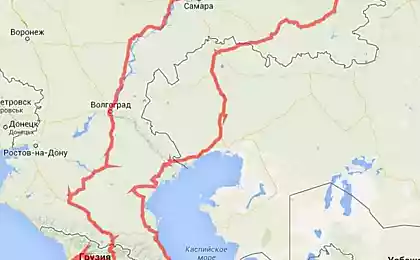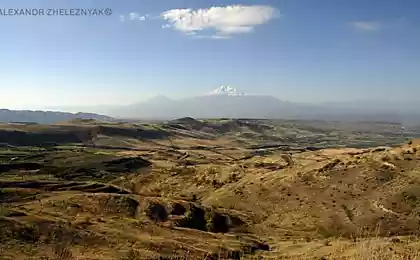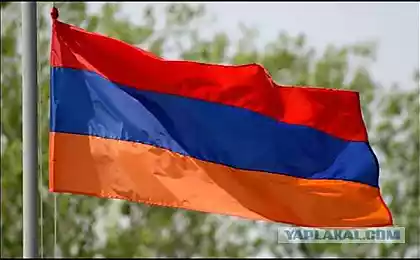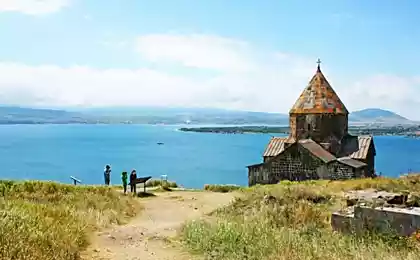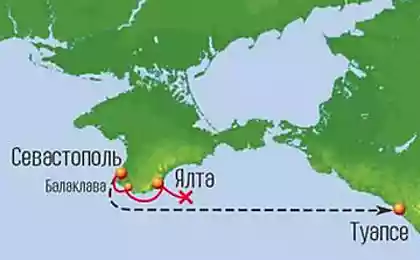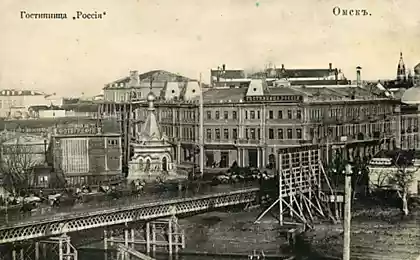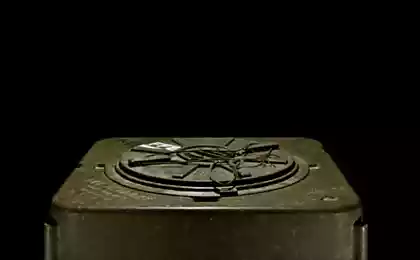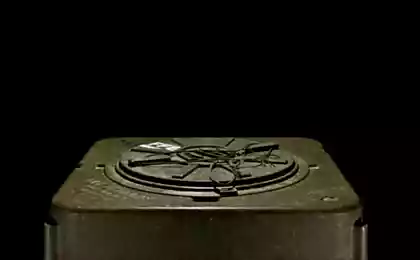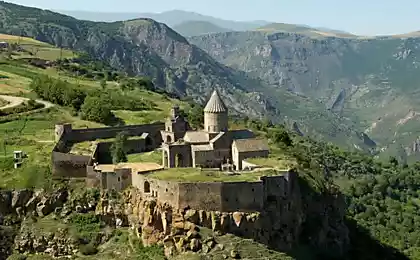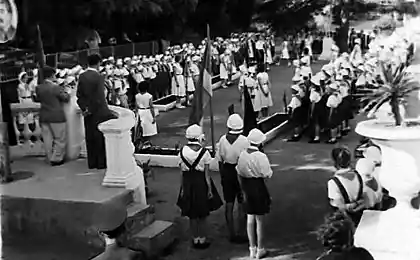1347
Dark years of Armenia
In the history of Armenia were different times, but one of them stands alone. Despite the short duration by historical standards - 3-4 years, so it left a deep impression, that the life of several generations of Armenians was divided into "before" and "after." The years from 1992 to 1995 called differently - "hungry", "cold", "bad". But the most common and comprehensive name - "Dark» ...
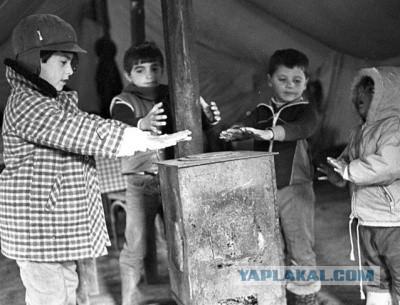
How many volumes of Lenin needed to heat the soup as not to freeze in the apartment and why lend deceased. The story of one of the apocalypse - Armenia in the early 1990s.
Say, in the presence of any Yerevantsi this phrase - "dark years", and you will see how the smile disappears for a moment and run through the face dark shadow. And there is some reason. In these few years - from 1992 to 1995, Armenia suffered unnoticed apocalypse scale single small country, the agony in which parted with his previous life. But then it seemed - with life in general ... When the summer of 1991 in Armenia ceased to act natural gas, few people thought that this consumer problem - only the first link in a chain of the most severe shocks awaiting the entire nation. Allegations of individuals that will soon be cut off, and electricity, were perceived perplexity and irony. In just like I could not believe on the "alarmists" laughed and joked. But events took place much worse than expected.
Collapse of the Soviet Union buried under its ruins economic and transport links, a common energy network. In connection with the war in Nagorno-Karabakh, Armenia was in a state of siege. From Azerbaijan to the country was blocked transit of gas, frozen railroads - weights, coming through Azerbaijani territory to Armenia just did not reach. From the south of the blockade of Armenia officially declared Turkey closed the border and cutting off all land and air traffic. Conflicts in Abkhazia and South Ossetia and the message made it impossible to Russia via Georgia. The only thread of transport - road to the Georgian port of Poti - physically unable to provide Armenia with all necessary. Stop deliveries of food, and most importantly - the grain and flour. Ceased to do almost everything - from matches and soap to raw materials and energy. Armenian NPP was stopped in 1990, thermal power plant in Armenia is deprived of oil and gas. And if there is no oil and gas - will not work and boiler. Energy disaster was imminent.
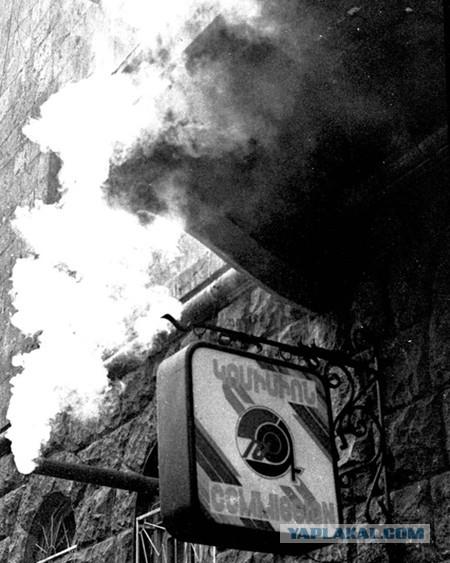
Electricity
Since January 1992 in Armenia began daily "blackouts" electricity. First cut off for a couple of hours later, this interval was inexorably increase - 6 hours, 9, 12, 18 ... By November, it was officially announced - the electricity in the apartment will be supplied only 1 hour per day. Each district had its own set this hour. With this rule, Armenians have lived for more than two years ... But even this hour was not guaranteed - because of numerous accidents in the electric operating with otherworldly load in many areas of electricity for weeks not fed at all. Appliances and equipment suddenly lost all meaning and steel furniture. Product of the strategic importance of steel paraffin candles and kerosene lamps, but last I had somewhere else to buy (after all the end of XX century in the yard!), And get a liter of kerosene or diesel oil was a matter of far difficult and expensive. One of the inventions of the Year - "Kerosene splinter" - tiny (50 ml) bottle of baby food, which is filled with a bit of diesel and through the hole in the cover slips tiny wick. Protruding end of the wick was covered with a scrap of glass tube 5-6 cm long - it used faulty fluorescent lighting. Light from a "torch" was less than that of the match, but it was burning for a long time and allow at least move around the apartment, without the risk of tripping and falling. Armenia 1990 lapsed into paganism and worship the light. Until now, we all remember how at the moment when the whole neighborhood resounded electricity joyful child's cry - "Hurrah! Light gave !!! "... And in an hour - total darkness again, for another 23 hours. The only exception is for the New Year - two whole days in the homes burned bulb worked TVs and electric heaters. And one exception - when people died. On this day, this building is not turned off the light. Yerevan anecdote of 1993: "We need the light of tomorrow, do not lend your corpse on the day?".
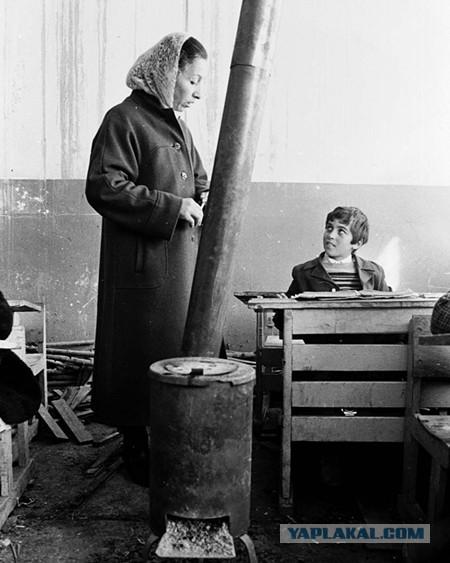
But the Armenians would not Armenians, even if in this critical situation did not find original solutions to problems. Those who lived at the junction of the two districts that receive electricity at different times, conducted a "left light" - simply put, stretched out on trees and poles electrical cable from the apartment next door to her. Thus, it was possible to have one hour instead of two whole, however, after removing the plug in my apartment, so as not to cause a short circuit. Fundamentals of electric circuits, the dependence of the power and voltage of the resistance, methods for determining the "phase" and "zero" - this course knowledge in a few weeks in Armenia have mastered everything - from children to the elderly elderly. "Left Light" was performed and from other sources - from operating plants and shops, the metro and even traffic lights on ...! Which often leads to accidents, accidents and fires. On the "left light" silently and stubbornly fought electricians, cut wire scissors on a long pole. After a couple of days' break place "restored again - until the next crawl electrician who in Armenia called pathetic and even as something divine -" Luys MARD "(man of light).
Car owners have found the solution to the "dark problem" - moved into the apartment batteries machines and join them thin wires hung tiny 12-volt light bulb on "strategic" points of the apartment - bathroom, toilet, living room. And during the holidays on "dead" chandelier hung a whole garland of lights. Electronics Armenia in makeshift conditions collected numerous modifications charger - for the hour when there is electricity, car battery had time to recharge at home. Some particularly nimble in the apartments were huge batteries of electric locomotives - they take up much space and were incredibly heavy, but their charge for long enough. Excellent acquisition is thought to work on the muscular strength of a flashlight, "beetle", so named for the distinctive sound when pressing the pedal dynamo. Portable TVs, powered by a 12 volt, boldly could equate to small gods - every night in the apartments where they had 10-15-inch black and white screens reverently seated all the neighbors to see the latest news and ... see the next series of "Santa -Barbary. " Timid attempts of men to see anything else strongly discourage women whom have been the vast majority of screens: "The battery will soon be exhausted, it is necessary to know the sequel!". Those lucky enough to see the next series, tells her friends, deprived of this opportunity. American writers of the series, without realizing it, have created for dipping into the darkness of Armenia some time axis - in the "dark years" in the protracted "Groundhog Day", running time was felt only by the primitive intrigue between the characters of the television series. But the batteries, "left the light", and even more - on gasoline engines were available only to a few. Most of Armenia's population lived these endless 3 years in pitch darkness.
Due to the lack of electricity and gas is acute and the other problem - cooking. What to cook food? People rushed to get wood stoves and kerosene stove (small stowed device running on kerosene or Local). On the few plants that still worked, electricity was. The woman working there, wearing the products to work to on homemade electric heaters that run on three-phase current, the home cook dinner. Shop for the production of electronic products, in the middle of which stands a meter piece of asbestos pipe wound on her thick red hot coil, and all of this - the pan with lunch - the usual picture of the time. In the pipe could shove and a couple of potatoes - bake for lunch. But to do this it was necessary to carefully and accurately - high voltage ... Results "industrial cooking" then hand delivered to their homes. But the plant has only a few ... the rest had worse - coffee brewed on a candle flame, boiled water for tea as well, but a pot of soup on the candle does not boil - needed the stove, and they had to be something to sink ...
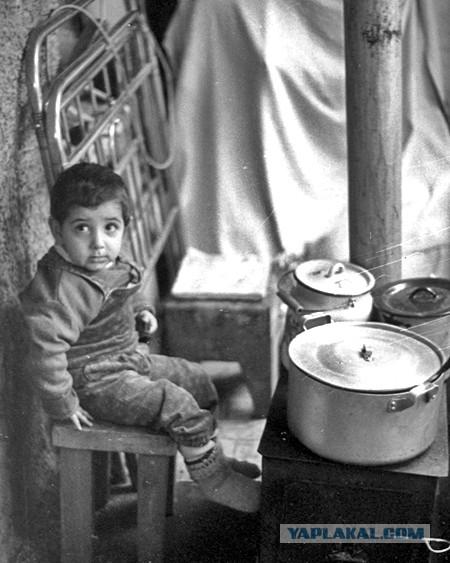
Chill
Winter 1992-1993, heaped up like a large-scale disaster. Batteries steam heating gave no signs of life, and electric and gas heaters were useless because of the lack of electricity and gas. Winter in the year was particularly cold temperatures for a long time did not rise above the level of minus 25 degrees. In unheated apartments freezing water in flower vases and buckets, and buildings froze water pipes and sewerage. Surreal - Yerevan residents of apartment buildings, walk down the stairs (the elevators were not working) on each floor met a man with a torch, which warmed the frozen sewer pipe - otherwise it all "good" threatened to splash out in the apartments ... Each floor has appointed duty with the torch from which was useful side effect - driveway pitch darkness at the time covered.
In the icy flats began to die lonely old people ... Chill became a real threat to people's lives, and deal with it in such conditions could only fire. How and what to make fire in the usual Yerevan apartment?
As humanitarian assistance especially unsecured segments of the population sometimes portrayed a little kerosene, but that was just enough to refuel kerosene stove, which is not particularly warm. The rest had only one choice - wood stove. Get in a modern city such stove was not easy, and secure its fuel -practically impossible, for firewood and a half million of the city, no one stocked. And burning stoves became Yerevan ... For the "dark years" in Yerevan apartment burned down forest with hills surrounding the city, parks, squares, alleys streets, orchards ... Everything else was classified then only one feature - lit or not. Burned all the railings, doors, windows and window frames entrances of buildings. Burned furniture, flooring, children's blocks, shoes, magazines, books ... great burning Publishing founders of Marxism-Leninism and materials CPSU Congress. Lenin once again become relevant - a pair of three volumes, with the thoughts of the Bolshevik leader enough to heat the soup. Woodburning stove held ideological purge Yerevan home libraries, leaving only what was really dear to the heart.
But even the mass destruction of the books and the trees were not able to provide a continuous fire stoves. Have you tried to sleep at home with an air temperature of 0 degrees? To go to bed, I had to ... dress warmly. Three layers of clothing, a hat, several pairs of socks, plenty of blankets - so went to bed in Yerevan. Not sometimes, not occasionally, but every day for 3-4 months a year. The heated water is poured into the evening bottle that as warmers obkladyvayut in bed. On the morning of the same washed with water - water "pododeyalnoy" temperature was nicer than the ice from the tap. The word "swim" was belong to the category of rare ceremonial rites, which were prepared for a long time and prudently. Schedule bathing in families was tough, cleanliness and personal hygiene - only in a queue. Inaccessible and distant dream, the absolute majority of the Armenians was a "swim with both hands," that is standing under the shower and not holding a hateful scoop with warm water.
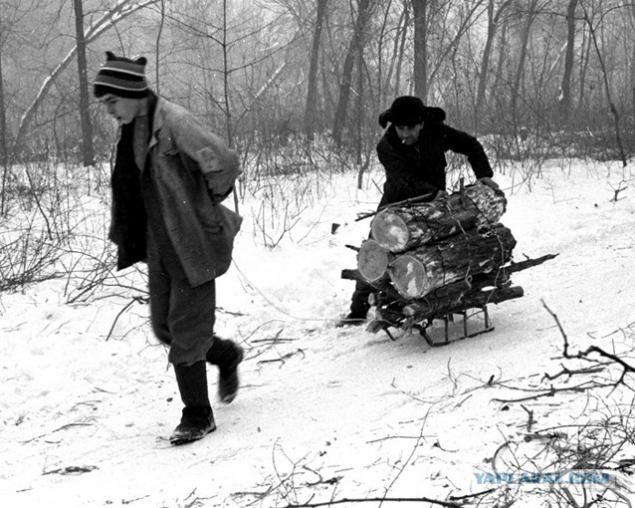
Bread
Along with a severe energy crisis and the problem arose of bread. Grain enters Armenia interruptions were introduced bread cards - 200 grams per person per day. For comparison, in the besieged Leningrad bread ration was 350 grams per day for workers munitions factories, 250 grams - for workers and 150 - for children and dependents. After the military reports from Karabakh main news was the amount received in Yerevan wagons with grain. Despite cards, bread is still lacking, in line at the store come to stand for days. The very same bread was often a mixture of flour and some inedible "food" supplements, gave him a greenish hue and odor. Normal supply of bread was carried out only for the army, fighting on the front, the others got out as best they could.
Foods such as eggs, cheese, meat, sausage, became a rarity and cost prohibitively expensive. Given that the majority of the population lost their jobs and, consequently, earnings, over many families actually threatened with starvation. Standard "break" the employee Yerevan enterprises in those years - a slice of bread with thinly spread on a jam (stocks last winter) or a small piece of cheese ... rescued Armenia Sevan whitefish and cheap eggplant, of whom learned to cook any dish that is rolled into jars for the winter, dried, pickled ... By the way, many of the "eggplant syndrome 'Save - even today in many families in the winter unjustified amount preserved eggplants.
Another "lifeline" rodstenniki were living in Russia and neighboring countries, by hook or by crook funneling money to their loved ones and small (because of problems with the airways) food parcels.
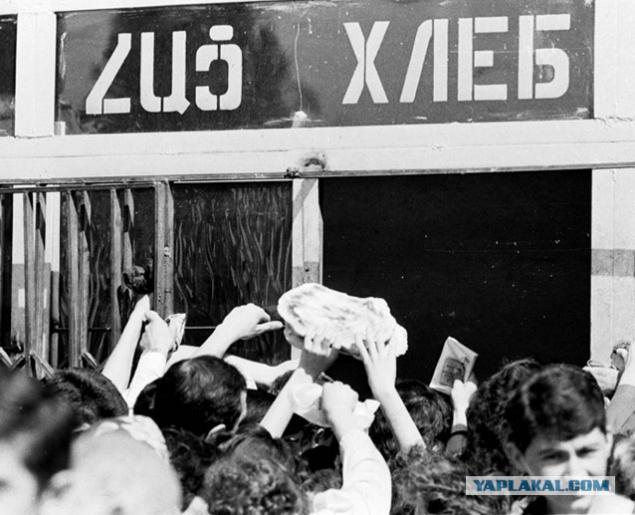
Communications
Special disaster "dark years" was the connection. Because of the lack of electricity stopped working PBX and telephone as a means of communication for a few years was forgotten completely. Phones sometimes spontaneously turns on, any call was like from another world. For emergencies in every neighborhood had one (!) Working phone, usually in ZhEKe. There could go to call an ambulance or the fire brigade. And if you had to know how are your relatives and friends, then sorry - you just have to go to them and find out. That go because public transportation existed only in the blessed memory of the townspeople. Rare buses were hung with clusters and reminds passengers of a sinking ship. Some trolleys have made timid attempts to leave the route, but inevitably idle hours during a power failure. But in Yerevan with its large height differences, and from these the frozen ghosts civilization visited sense - if dotolkat trolley to the nearest shutter, you can, jumping into it at idle to drive as much as 3-4 stops. Naturally, not stopping. Then - again on foot. And walked 10-15 kilometers. A typical picture of the time - a long line of people wandering along a deserted highway. Go to work on foot, on a visit (and as without it!). Car for a while again became a luxury. And in the evening hours on pedestrians attacked huge flocks of stray dogs - and hunger drove them. Rightful owners of the same steel in the rat, reproduced in large quantities. Now, years later, it is difficult to understand - what do they eat?
But even in such terrible conditions clearly manifested strong Armenian national traits - the desire to communicate, sense of humor and mutual support. In the icy dark apartment neighbors gathered together to pass the long evenings of the endless game of backgammon and a retelling of the latest news. At dinner, read, saw off to war, raise children, joked, sang songs and even danced ...
Man is able to withstand a lot. And eventually the Armenians survived. However, not all. Since 1992, a mass exodus from the country - people are leaving anywhere, to anywhere in the world, just to survive, just to keep warm, if only children and old men were in the human condition. And upbraided them in this difficult ... Planes flying away from Yerevan, resembled a crowded trolley - flew standing. The cost of one-bedroom apartment in the center of Yerevan was then no more than a couple of thousand dollars, many still remember the ads on the windows and balconies of buildings: "I have an apartment on the ticket." For the "dark years" three million to Armenia, according to various estimates, has left more than a million people. Yerevan literally empty.
Looking at today's Yerevan, Yerevan residents on, it's hard to believe that many of them have been together all this - cold, hunger and darkness. The nightmare was in the past, which today no one likes to remember. But hundreds of thousands of felled trees resemble - the hundreds of thousands left. They went together - the trees and people. Remained the strongest. And roots. So - life goes on.
via
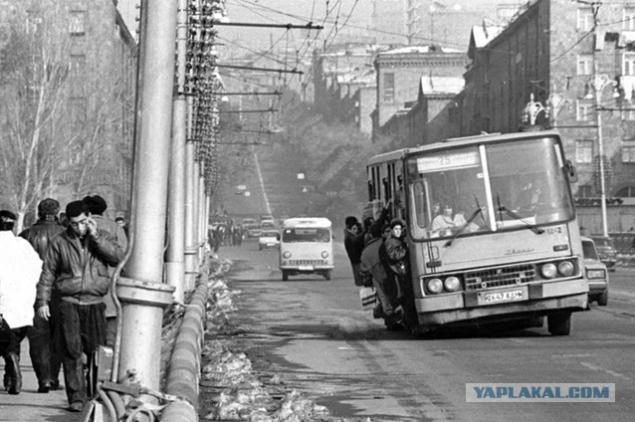

How many volumes of Lenin needed to heat the soup as not to freeze in the apartment and why lend deceased. The story of one of the apocalypse - Armenia in the early 1990s.
Say, in the presence of any Yerevantsi this phrase - "dark years", and you will see how the smile disappears for a moment and run through the face dark shadow. And there is some reason. In these few years - from 1992 to 1995, Armenia suffered unnoticed apocalypse scale single small country, the agony in which parted with his previous life. But then it seemed - with life in general ... When the summer of 1991 in Armenia ceased to act natural gas, few people thought that this consumer problem - only the first link in a chain of the most severe shocks awaiting the entire nation. Allegations of individuals that will soon be cut off, and electricity, were perceived perplexity and irony. In just like I could not believe on the "alarmists" laughed and joked. But events took place much worse than expected.
Collapse of the Soviet Union buried under its ruins economic and transport links, a common energy network. In connection with the war in Nagorno-Karabakh, Armenia was in a state of siege. From Azerbaijan to the country was blocked transit of gas, frozen railroads - weights, coming through Azerbaijani territory to Armenia just did not reach. From the south of the blockade of Armenia officially declared Turkey closed the border and cutting off all land and air traffic. Conflicts in Abkhazia and South Ossetia and the message made it impossible to Russia via Georgia. The only thread of transport - road to the Georgian port of Poti - physically unable to provide Armenia with all necessary. Stop deliveries of food, and most importantly - the grain and flour. Ceased to do almost everything - from matches and soap to raw materials and energy. Armenian NPP was stopped in 1990, thermal power plant in Armenia is deprived of oil and gas. And if there is no oil and gas - will not work and boiler. Energy disaster was imminent.

Electricity
Since January 1992 in Armenia began daily "blackouts" electricity. First cut off for a couple of hours later, this interval was inexorably increase - 6 hours, 9, 12, 18 ... By November, it was officially announced - the electricity in the apartment will be supplied only 1 hour per day. Each district had its own set this hour. With this rule, Armenians have lived for more than two years ... But even this hour was not guaranteed - because of numerous accidents in the electric operating with otherworldly load in many areas of electricity for weeks not fed at all. Appliances and equipment suddenly lost all meaning and steel furniture. Product of the strategic importance of steel paraffin candles and kerosene lamps, but last I had somewhere else to buy (after all the end of XX century in the yard!), And get a liter of kerosene or diesel oil was a matter of far difficult and expensive. One of the inventions of the Year - "Kerosene splinter" - tiny (50 ml) bottle of baby food, which is filled with a bit of diesel and through the hole in the cover slips tiny wick. Protruding end of the wick was covered with a scrap of glass tube 5-6 cm long - it used faulty fluorescent lighting. Light from a "torch" was less than that of the match, but it was burning for a long time and allow at least move around the apartment, without the risk of tripping and falling. Armenia 1990 lapsed into paganism and worship the light. Until now, we all remember how at the moment when the whole neighborhood resounded electricity joyful child's cry - "Hurrah! Light gave !!! "... And in an hour - total darkness again, for another 23 hours. The only exception is for the New Year - two whole days in the homes burned bulb worked TVs and electric heaters. And one exception - when people died. On this day, this building is not turned off the light. Yerevan anecdote of 1993: "We need the light of tomorrow, do not lend your corpse on the day?".

But the Armenians would not Armenians, even if in this critical situation did not find original solutions to problems. Those who lived at the junction of the two districts that receive electricity at different times, conducted a "left light" - simply put, stretched out on trees and poles electrical cable from the apartment next door to her. Thus, it was possible to have one hour instead of two whole, however, after removing the plug in my apartment, so as not to cause a short circuit. Fundamentals of electric circuits, the dependence of the power and voltage of the resistance, methods for determining the "phase" and "zero" - this course knowledge in a few weeks in Armenia have mastered everything - from children to the elderly elderly. "Left Light" was performed and from other sources - from operating plants and shops, the metro and even traffic lights on ...! Which often leads to accidents, accidents and fires. On the "left light" silently and stubbornly fought electricians, cut wire scissors on a long pole. After a couple of days' break place "restored again - until the next crawl electrician who in Armenia called pathetic and even as something divine -" Luys MARD "(man of light).
Car owners have found the solution to the "dark problem" - moved into the apartment batteries machines and join them thin wires hung tiny 12-volt light bulb on "strategic" points of the apartment - bathroom, toilet, living room. And during the holidays on "dead" chandelier hung a whole garland of lights. Electronics Armenia in makeshift conditions collected numerous modifications charger - for the hour when there is electricity, car battery had time to recharge at home. Some particularly nimble in the apartments were huge batteries of electric locomotives - they take up much space and were incredibly heavy, but their charge for long enough. Excellent acquisition is thought to work on the muscular strength of a flashlight, "beetle", so named for the distinctive sound when pressing the pedal dynamo. Portable TVs, powered by a 12 volt, boldly could equate to small gods - every night in the apartments where they had 10-15-inch black and white screens reverently seated all the neighbors to see the latest news and ... see the next series of "Santa -Barbary. " Timid attempts of men to see anything else strongly discourage women whom have been the vast majority of screens: "The battery will soon be exhausted, it is necessary to know the sequel!". Those lucky enough to see the next series, tells her friends, deprived of this opportunity. American writers of the series, without realizing it, have created for dipping into the darkness of Armenia some time axis - in the "dark years" in the protracted "Groundhog Day", running time was felt only by the primitive intrigue between the characters of the television series. But the batteries, "left the light", and even more - on gasoline engines were available only to a few. Most of Armenia's population lived these endless 3 years in pitch darkness.
Due to the lack of electricity and gas is acute and the other problem - cooking. What to cook food? People rushed to get wood stoves and kerosene stove (small stowed device running on kerosene or Local). On the few plants that still worked, electricity was. The woman working there, wearing the products to work to on homemade electric heaters that run on three-phase current, the home cook dinner. Shop for the production of electronic products, in the middle of which stands a meter piece of asbestos pipe wound on her thick red hot coil, and all of this - the pan with lunch - the usual picture of the time. In the pipe could shove and a couple of potatoes - bake for lunch. But to do this it was necessary to carefully and accurately - high voltage ... Results "industrial cooking" then hand delivered to their homes. But the plant has only a few ... the rest had worse - coffee brewed on a candle flame, boiled water for tea as well, but a pot of soup on the candle does not boil - needed the stove, and they had to be something to sink ...

Chill
Winter 1992-1993, heaped up like a large-scale disaster. Batteries steam heating gave no signs of life, and electric and gas heaters were useless because of the lack of electricity and gas. Winter in the year was particularly cold temperatures for a long time did not rise above the level of minus 25 degrees. In unheated apartments freezing water in flower vases and buckets, and buildings froze water pipes and sewerage. Surreal - Yerevan residents of apartment buildings, walk down the stairs (the elevators were not working) on each floor met a man with a torch, which warmed the frozen sewer pipe - otherwise it all "good" threatened to splash out in the apartments ... Each floor has appointed duty with the torch from which was useful side effect - driveway pitch darkness at the time covered.
In the icy flats began to die lonely old people ... Chill became a real threat to people's lives, and deal with it in such conditions could only fire. How and what to make fire in the usual Yerevan apartment?
As humanitarian assistance especially unsecured segments of the population sometimes portrayed a little kerosene, but that was just enough to refuel kerosene stove, which is not particularly warm. The rest had only one choice - wood stove. Get in a modern city such stove was not easy, and secure its fuel -practically impossible, for firewood and a half million of the city, no one stocked. And burning stoves became Yerevan ... For the "dark years" in Yerevan apartment burned down forest with hills surrounding the city, parks, squares, alleys streets, orchards ... Everything else was classified then only one feature - lit or not. Burned all the railings, doors, windows and window frames entrances of buildings. Burned furniture, flooring, children's blocks, shoes, magazines, books ... great burning Publishing founders of Marxism-Leninism and materials CPSU Congress. Lenin once again become relevant - a pair of three volumes, with the thoughts of the Bolshevik leader enough to heat the soup. Woodburning stove held ideological purge Yerevan home libraries, leaving only what was really dear to the heart.
But even the mass destruction of the books and the trees were not able to provide a continuous fire stoves. Have you tried to sleep at home with an air temperature of 0 degrees? To go to bed, I had to ... dress warmly. Three layers of clothing, a hat, several pairs of socks, plenty of blankets - so went to bed in Yerevan. Not sometimes, not occasionally, but every day for 3-4 months a year. The heated water is poured into the evening bottle that as warmers obkladyvayut in bed. On the morning of the same washed with water - water "pododeyalnoy" temperature was nicer than the ice from the tap. The word "swim" was belong to the category of rare ceremonial rites, which were prepared for a long time and prudently. Schedule bathing in families was tough, cleanliness and personal hygiene - only in a queue. Inaccessible and distant dream, the absolute majority of the Armenians was a "swim with both hands," that is standing under the shower and not holding a hateful scoop with warm water.

Bread
Along with a severe energy crisis and the problem arose of bread. Grain enters Armenia interruptions were introduced bread cards - 200 grams per person per day. For comparison, in the besieged Leningrad bread ration was 350 grams per day for workers munitions factories, 250 grams - for workers and 150 - for children and dependents. After the military reports from Karabakh main news was the amount received in Yerevan wagons with grain. Despite cards, bread is still lacking, in line at the store come to stand for days. The very same bread was often a mixture of flour and some inedible "food" supplements, gave him a greenish hue and odor. Normal supply of bread was carried out only for the army, fighting on the front, the others got out as best they could.
Foods such as eggs, cheese, meat, sausage, became a rarity and cost prohibitively expensive. Given that the majority of the population lost their jobs and, consequently, earnings, over many families actually threatened with starvation. Standard "break" the employee Yerevan enterprises in those years - a slice of bread with thinly spread on a jam (stocks last winter) or a small piece of cheese ... rescued Armenia Sevan whitefish and cheap eggplant, of whom learned to cook any dish that is rolled into jars for the winter, dried, pickled ... By the way, many of the "eggplant syndrome 'Save - even today in many families in the winter unjustified amount preserved eggplants.
Another "lifeline" rodstenniki were living in Russia and neighboring countries, by hook or by crook funneling money to their loved ones and small (because of problems with the airways) food parcels.

Communications
Special disaster "dark years" was the connection. Because of the lack of electricity stopped working PBX and telephone as a means of communication for a few years was forgotten completely. Phones sometimes spontaneously turns on, any call was like from another world. For emergencies in every neighborhood had one (!) Working phone, usually in ZhEKe. There could go to call an ambulance or the fire brigade. And if you had to know how are your relatives and friends, then sorry - you just have to go to them and find out. That go because public transportation existed only in the blessed memory of the townspeople. Rare buses were hung with clusters and reminds passengers of a sinking ship. Some trolleys have made timid attempts to leave the route, but inevitably idle hours during a power failure. But in Yerevan with its large height differences, and from these the frozen ghosts civilization visited sense - if dotolkat trolley to the nearest shutter, you can, jumping into it at idle to drive as much as 3-4 stops. Naturally, not stopping. Then - again on foot. And walked 10-15 kilometers. A typical picture of the time - a long line of people wandering along a deserted highway. Go to work on foot, on a visit (and as without it!). Car for a while again became a luxury. And in the evening hours on pedestrians attacked huge flocks of stray dogs - and hunger drove them. Rightful owners of the same steel in the rat, reproduced in large quantities. Now, years later, it is difficult to understand - what do they eat?
But even in such terrible conditions clearly manifested strong Armenian national traits - the desire to communicate, sense of humor and mutual support. In the icy dark apartment neighbors gathered together to pass the long evenings of the endless game of backgammon and a retelling of the latest news. At dinner, read, saw off to war, raise children, joked, sang songs and even danced ...
Man is able to withstand a lot. And eventually the Armenians survived. However, not all. Since 1992, a mass exodus from the country - people are leaving anywhere, to anywhere in the world, just to survive, just to keep warm, if only children and old men were in the human condition. And upbraided them in this difficult ... Planes flying away from Yerevan, resembled a crowded trolley - flew standing. The cost of one-bedroom apartment in the center of Yerevan was then no more than a couple of thousand dollars, many still remember the ads on the windows and balconies of buildings: "I have an apartment on the ticket." For the "dark years" three million to Armenia, according to various estimates, has left more than a million people. Yerevan literally empty.
Looking at today's Yerevan, Yerevan residents on, it's hard to believe that many of them have been together all this - cold, hunger and darkness. The nightmare was in the past, which today no one likes to remember. But hundreds of thousands of felled trees resemble - the hundreds of thousands left. They went together - the trees and people. Remained the strongest. And roots. So - life goes on.
via

